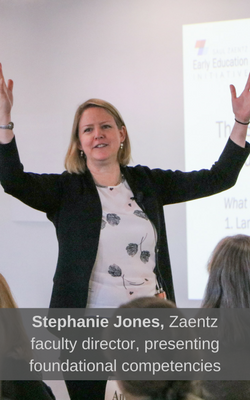2017 Promoting Young Children’s Language, Literacy, and Social-Emotional Competencies
Zaentz Academy Institute Focuses on Bridging Language, Literacy, and Social-Emotional Development for our Youngest Learners
The Saul Zaentz Professional Learning Academy hosted its Promoting Young Children’s Language, Literacy, and Social-Emotional Competencies institute in December, 2017 at the Harvard Graduate School of Education.
Zaentz faculty co-directors, Nonie Lesaux and Stephanie Jones, led the institute, focusing on the latest science of how young children build competencies in the domains of language, literacy, and social-emotional simultaneously. “We may think about teaching these domains in silos,” said Lesaux, “but children’s brains don’t develop that way.”
A recent piece in Usable Knowledge illustrates the interrelatedness of language, literacy, and social-emotional development and outlines tips for how early educators can draw on these findings in their everyday practice. For example, practices such as increasing classroom talk and establishing predictable routines can be used together to enhance and complement healthy development across domains in young children.
Differences are not deficiencies
Guest speaker and HGSE Professor of Education, Paola Uccelli, presented on the importance of bilingualism and biculturalism for schooling and its role in early identity formation.
Uccelli highlighted assumptions educators might make about cognitive ability when they listen to or read stories produced by children of another culture. “Differences are not deficiencies,” Uccelli cautioned.
Her session concluded with advice for early educators and leaders to focus less on which language children speak and more on building that language including empowering parents to speak, sing, and play often with their children in their native language.
